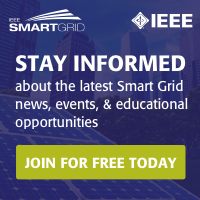About IEEE Smart Grid
Click here to read the 2015 IEEE Smart Grid Annual Report.
What is the Smart Grid?
Smart Grid deployment is imperative, not just in the United States but around the globe. But the smart grid is a revolutionary undertaking—entailing new communications-and-control capabilities, energy sources, generation models and adherence to cross-jurisdictional regulatory structures. Successful rollout will demand objective collaboration, integration, and interoperability among a phenomenal array of disciplines, including computational and communications control systems for generation, transmission, distribution, customer, operations, markets and service provider.
What is IEEE Smart Grid?
IEEE is the obvious entity to assume the critical unifying role in the smart-grid movement for a variety of reasons. It is the world’s largest and most comprehensive professional association. It has an unmatched diversity of global expertise across both established and emerging technologies, rich programs, proven standards and a lifecycle of related processes that promote technology adoption and open and build global markets. Finally, IEEE is a nonprofit that brings objective coordination among the huge cast of public and private organizations that will contribute to the smart grid’s development.
IEEE Smart Grid provides expertise and guidance for individuals and organizations involved in the modernization and optimization of the power grid. IEEE Smart Grid was conceptualized and led under the direction of Wanda Reder, former President of the IEEE Power & Energy Society, as a New Initiative in IEEE Future Directions Committee (FDC) in 2011.
The IEEE FDC, in association with Societies, Councils, and Organizational Units (OUs), anticipates and determines the direction of existing, new, and emerging technologies and related issues, and spearheads their investigation and development by IEEE. Taking a holistic view, the FDC emphasizes new, emerging technical areas and drives them to maturity within the IEEE infrastructure. Additionally, the FDC serves as a liaison to and fosters cooperative efforts among Societies, Councils, and industry to develop new products and services in emerging topics.
In November 2013, after two years as an incubation project of FDC, IEEE voted to graduate IEEE Smart Grid from the IEEE FDC to a fully functioning program of IEEE. It was agreed that the IEEE Power & Energy Society would become the new administrator of the Initiative and continue and grow upon its momentum, beginning in January 2014.
Vision
IEEE Smart Grid Initiative brings together IEEE’s broad array of technical societies and organizations through collaboration to encourage the successful rollout of technologically advanced, environment-friendly and secure smart-grid networks around the world.
Mission
IEEE Smart Grid is the professional community and leading provider of globally recognized Smart Grid information. IEEE Smart Grid Initiative is intended to organize, coordinate, leverage and build upon the strength of various entities within IEEE with Smart Grid expertise and interest.
Goals
- Serve as a Credible and Authoritative Voice by:
- Promoting IEEE organizational units and their members as the credible voice for Smart Grid knowledge, and
- Building its brand as the recognized authority for Smart Grid knowledge globally through focus on organizing, coordinating and leveraging upon the strength of various entities within IEEE with smart grid expertise and interest.
- Increase Value through collaborative partnerships with IEEE organizational units, their members and the public at large through tools that effectively meet, anticipate and exceed their needs.
Strategies
Engage
Via Knowledge - Create, promote and disseminate interdisciplinary Smart Grid knowledge ensuring IEEE’s organizational units and members are leaders in the profession, the industry and their communities.
Enable
Via Collaboration - Align resources and empower IEEE organizational units, members and allied professionals to build teamwork.
Empower
Via Communication - Elevate the voice of IEEE organizational units and members to promote the value of their work in the Smart Grid field and to enhance the public’s understanding of the importance of the Smart Grid
Via Advocacy - Advance Smart Grid policies through outreach, education and engagement that are responsive to the public and the profession.
Objectives
- Set the Global Standard via Collaboration
- Bring together all stakeholders under one umbrella, serving as the leader in the Smart Grid movement and number one resource for enabling Smart Grid technologies. Be “the” place to go for information and collaboration. This concept reflects the leadership position of IEEE and its authority as an unbiased source.
- Ensure that our volunteers gain experience and visibility that benefit IEEE organizational units, its members and the public.
- Attract IEEE organizational units, their members and Smart Grid technical experts who deliver rich content and bring diverse knowledge and perspectives regarding Smart Grid.
- Serve as the trusted “voice” for the engineering and computing and technology communities around the world.
- Leverage cross-organizational stakeholder efforts and engage all stakeholders through collaboration, education and innovation to facilitate the delivery of more efficient, renewable and secure forms of energy throughout the world.
- Provide a non-biased and balanced understanding of Smart Grid.
- Provide Education, Research and Innovation
- Provide globally accessible and state of the art educational opportunities that will foster career-long learning focused on technical excellence.
- Cultivate innovative and practical ideas that expand the boundaries of Smart Grid.
- Be the leading technical and information resource for the Smart Grid profession.
- Develop intellectual capital that serves the public interest.
- Expand Global Reach via Marketing
- Further the reputation and influence of the Smart Grid profession among the public.
- Serve as a stage for Smart Grid professionals to relay their work in the field.


